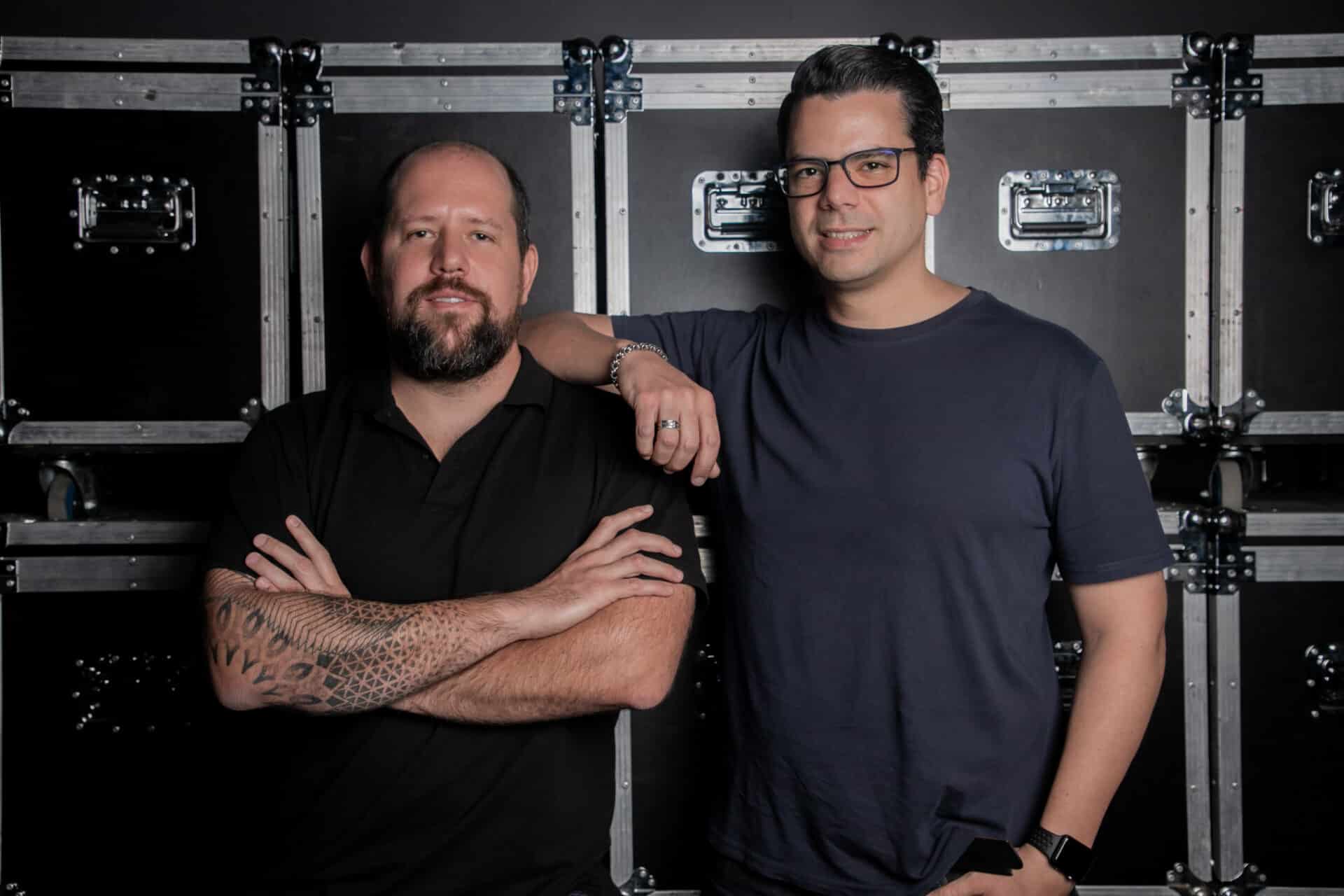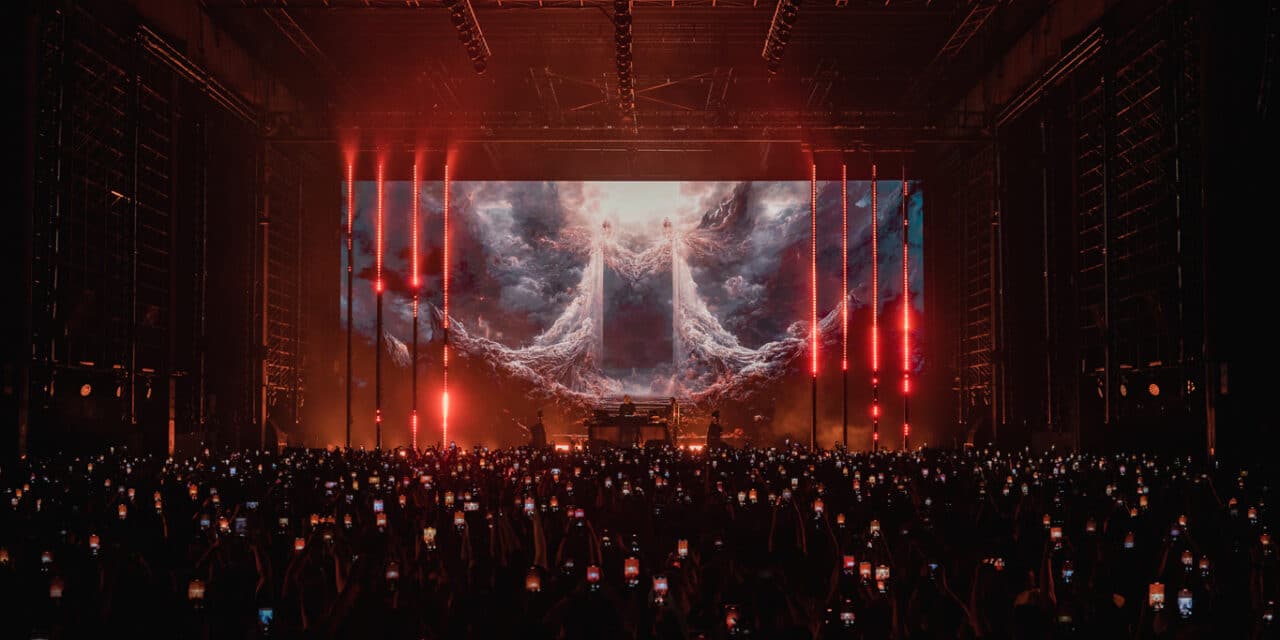NEW VENUE, SORT OF: Since 2020, live entertainment company M-S Live has come on board at Arca in Sao Paulo, Brazil, a full spectrum of event planning, production and operation solutions have been offered to clients.. (Courtesy M-S Live)
There’s a new live events building in Sao Paulo, Brazil. It’s not brand-new. Technically, it first opened in 2018, purely as a building for hire. Since 2020, live entertainment company M-S Live has come on board, offering the full spectrum of event planning, production and operation solutions to clients.
The building’s name: Arca. The mission: to attract and host all manner of creative industry.
M-S Live founders Mario Albuquerque and Mauricio Soares have vast event, technology, and real estate experience. International projects Albuquerque has worked on include Tomorrowland Brasil, Electric Zoo, Elrow, Timewarp and Circoloco. He’s also a club founder, including Laroc, and Ame in Valinhos. Soares built a career in technology, real estate, and has worked as a consultant for brands like Nike, GM and Microsoft.

Mario Albuquerque and Mauricio Soares
Arca has already hosted brands such as Nike, São Paulo Fashion Week, Boiler Room, music festivals like Time Warp, artists like Charlotte De Witte, Claptone, Peggy Gou, Anjunadeep, Adam Beyer, and more. Arca was also one of seven venues worldwide to host Eric Prydz’s “Holo” show.
Albuquerque and Soares intend to build on this young but impressive legacy, “to bring together people, perspectives, languages and cultures in fantastic environments, creating experiences that provoke the senses and awaken consciousness,” as a joint statement reads.
Arca has almost 9,000 square meters of internal area under a 16-meter high ceiling, offering space for up to 6,400 people. The central nave is equipped with a grid of trusses with high load capacity of up to 30 tons, distributed by the lifting points (lifting points are charged separates on a pay-per-use basis).
The designers didn’t touch the vertical metal panels from the original factory, which can be used creatively for visual communication, scenography and lighting.
The former mezzanine has been restored and transformed, and today serves multiple purposes, including as dressing room or production room. There’s ample outdoor space surrounding the venue, dubbed “the Boulevard.” Native species of trees were planted significantly lowering the visual impact of the building – a real show of shades of green, flowers, and fruits.
VenuesNow wanted to know a bit more about Arca and M-S Live, who claim that all ticketed events since joining forces in 2020 have sold out.
VenuesNow: When did ARCA open? What was the first event there and when was that?
Mario Albuquerque: ARCA opened its doors for the first time on Oct. 22, 2018, for the 46th edition of São Paulo Fashion Week.
What’s the capacity range of Arca? Is it modular, and can you host seated and standing events?
ARCA already hosted a wide range of events, from a gala dinner for 80 people to electronic music shows with up to 6,400 attendants, from an innovation conference with four stages to a street basketball tournament. It’s a blank canvas for events, an indoor space with a nearly unobstructed area of almost 9,000 square meters and a 16-meter high ceiling.
How does it complement the venue circuit in Sao Paulo? Are you intending to attract more international tours, or is Arca first and foremost a club-style venue?
Arca was the first of its kind in São Paulo. A brutalist, industrial venue from the 1940’s, repurposed and fully prepared to host world-class events, proudly maintaining its original raw atmosphere and features. Electronic music represents about 25% of its total occupation, the rest being mostly a combination of fairs, product launches, conferences, corporate and social events.
Tying into that: is the plan to keep the music electronic, or could you see yourselves hosting live bands as well?
In music, electronic still is and will probably be our main focus in years to come, but we’re always open to special projects, no matter the style. Last year we hosted the first show of Luisa Sonza’s new tour, “O Conto dos Dois Mundos.” She’s one of Brazil’s biggest pop stars at the moment, alongside Anitta.
Any cultural or economical peculiarities that are unique to Sao Paulo, in the way people approach partying that are worth mentioning?
The Brazilian audience is among the most passionate in the world – and São Paulo is no exception. There was a “golden era” of clubs in the city between the late 90’s and early 00’s, but now most of the activity in the scene happens in touring party labels and festivals of different sizes. As we don’t have a very harsh winter, there are events happening throughout the year. We just don’t get that many big-profile international artists between late May and early September because of the summer season in the northern hemisphere.
How much can you charge for tickets when comparing it internationally? Is there a stark income gap within society that affects the range of tickets you offer?
It’s impossible to talk about Brazil as a single, big, homogeneous market. There is indeed a stark income gap within our society, but there are also huge differences between regions, states and even cities. São Paulo’s metropolitan area comprises over 20 million people and the cost of living here compares to that of cities in Europe and the USA.
That said, only about 10% of the population actually has purchase power to attend our events, from which around 15-20% look for a more exclusive experience and are willing to pay a premium for it – and there’s the 0,1%, the high-spenders that travel to Ibiza and Tulum every year, and are regulars at the VIP tables.
When talking about ticket prices in Brazil, one also has to be aware of the distortions caused by the “meia-entrada” – a law that imposes a 50% discount on tickets sold to students, public school teachers, elderly citizens over the age of 65 and some other groups, up to the limit of 40% of the total tickets. That, of course, represents a significant impact on ticket revenue – so the promoters adjusted their pricing framework and got creative in terms of working with third-party promotion teams, special discounts for clients of the sponsors and other tactics to level the field. That is to say that, although the average ticket “list price” is usually higher than that of other international markets, the average ticket price that people actually pay is lower, because of both the “meia-entrada” and other forms of discount.
What’s your business philosophy?
Average is not good enough, there’s always room for improvement and we gotta have fun along the way.
What’s next for ARCA, what upcoming events/developments would you like to highlight?
Of course we will continue to develop collaborations with leading international labels, some of which are unprecedented in Brazil. We’re also exploring the new media art scene, something for which we believe the ARCA atmosphere is perfect. Moreover, after the successful launch of mottus, our first original brand, we have two more in our pipeline, which will focus on different genres and crowds and should be launched in the second semester of 2023.







